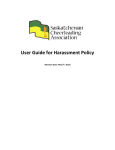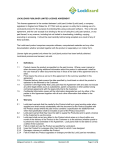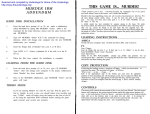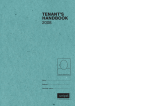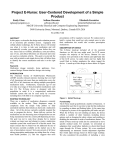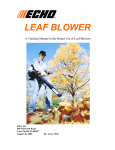Download SCA User Guide for Harassment Policy
Transcript
User Guide for Harassment Policy (Revision Date: April 22nd, 2011) Table of Contents GENERAL INFORMATION 3 POLICY STATEMENT 3 DEFINITIONS 4 RESPONSIBILITY 4 HARASSMENT OFFICERS 5 CONSENSUAL RELATIONSHIPS 6 DISCIPLINARY ACTION 6 CONFIDENTIALITY 6 COMPLAINT PROCEDURE 6 PROCEDURE WHERE A PERSON BELIEVES THAT A COLLEAGUE HAS BEEN HARASSED 9 APPEALS 9 REVIEW AND APPROVAL 10 CODE OF ETHICS FOR SPORT IN SASKATCHEWAN 11 INTRODUCTION 11 COMPETENCE 11 JUSTICE 11 RESPONSIBILITY 11 INTEGRITY 11 LEADERSHIP 12 EQUALITY 12 COOPERATION 12 GLOSSARY ERROR! BOOKMARK NOT DEFINED. General Information This policy is setup with the following: 1. Policy Statement 2. Definitions 3. Complaint & Appeal Procedure 4. Disciplinary Action 5. Education/Information Policy Statement The Saskatchewan Cheerleading Association is committed to providing a sport and work environment in which all individuals are treated with respect and dignity. Each individual has the right to participate and work in an environment that promotes equal opportunities and prohibits discriminatory practices. · Harassment is a form of discrimination. Harassment is prohibited by the Canadian Charter of Rights and Freedoms and by human rights legislation in the province of Saskatchewan. · Harassment is offensive, degrading, and threatening. In its most extreme forms, harassment can be an offence under the Canadian Criminal Code. · Whether the harasser is a director, supervisor, employee, coach, official, volunteer, parent, or athlete, harassment is an attempt by one person to assert abusive, unwarranted power over another. · The Saskatchewan Cheerleading Association is committed to providing a sport environment free of harassment on the basis of race, national or ethnic origin, colour, religion and creed, age, gender, sexual orientation, marital status, family status, disability, being in receipt of public assistance, or pardoned conviction. · In addition, the Occupational Health and Safety Act covers harassment in employment situations. It includes all of the areas dealt with by The Saskatchewan Human Rights Code. It also covers harassment because of physical appearance. 1. 2. 3. 4. This policy applies to all employees, directors, officers, volunteers, coaches, advisors, athletes, judges, and members of the Saskatchewan Cheerleading Association. The Saskatchewan Cheerleading Association encourages the reporting of all incidents of harassment, regardless of who may be the offender. This policy applies to harassment that may occur during the course of all Saskatchewan Cheerleading Association business, activities, and events. It also applies to harassment between individuals associated with the Saskatchewan Cheerleading Association but outside Saskatchewan Cheerleading Association business, activities, and events when such harassment adversely affects relationships within the Saskatchewan Cheerleading Association ‘s work and sport environment. Notwithstanding this policy, every person who experiences harassment continues to have the right to seek assistance from the Saskatchewan Human Rights Commission, even when steps are being taken under this policy. Definitions 5. 6. 7. 8. 9. Harassment is a form of discrimination, and refers to conduct associated with a prohibited ground that negatively affects the work or sport environment or leads to adverse consequences within that environment for the person(s) experiencing the harassment, which the perpetrator knew or ought reasonably to have known would be unwelcome. Harassment can take many forms. It may be verbal, physical, visual or psychological. It can include but is not limited to: · written or verbal abuse or threats; · the display of racist, sexist or other offensive material; · unwelcome remarks, jokes, comments, innuendo, or taunting about a person's looks, body, attire, age, intellectual ability, race, religion, gender, or sexual orientation; · leering other suggestive or obscene gestures; · condescending, paternalistic, or patronizing behaviour which undermines self-‐esteem, diminishes performance, or adversely affects working conditions; · practical jokes which cause awkwardness or embarrassment, endanger a person's safety, or negatively affect performance; · unwanted physical contact, including touching, petting, pinching, or kissing; · unwelcome sexual flirtations, advances, requests, or invitations; or · physical or sexual assault. (Note: sexual or physical assault are criminal offenses and the appropriate police authorities should be contacted.) For the purposes of this policy, sexual harassment is unwelcome sexual advances, requests for sexual favours, or other verbal or physical conduct of a sexual nature when: · submitting to or rejecting this conduct is used as the basis for making decisions which affect the individual; or · such conduct has the purpose or effect of interfering with an individual's performance; or · such conduct creates an insulting, intimidating, humiliating, malicious, degrading or offensive environment. Sexual harassment can be perpetrated by males against females; females against males, between males or between females. For the purposes of this policy, retaliation against an individual · for having filed a complaint under this policy; or · for having participated in any procedure under this policy; or · for having been associated with a person who filed a complaint or participated in any procedure under this policy, will be treated as harassment, and will not be tolerated. Responsibility 10. The Saskatchewan Cheerleading Association is committed to creating and maintaining a supportive sport environment free of all forms of harassment. The Saskatchewan Cheerleading Association will implement and administer this policy internally by: Appointing a harassment committee which shall be responsible to: · discourage and prevent harassment within the Saskatchewan Cheerleading Association; · investigate formal complaints of harassment in a sensitive, responsible and timely manner; · · · · · · impose appropriate disciplinary or corrective measures when a complaint of harassment has been substantiated, regardless of the position or authority of the offender; provide guidance to persons who experience harassment; do all in their power to support and assist any employee or member of the Saskatchewan Cheerleading Association who experiences harassment by someone who is not an employee or member of the Saskatchewan Cheerleading Association; make all members and employees of the Saskatchewan Cheerleading Association aware of the problem of harassment, and in particular, sexual harassment, and of the procedures contained in this policy; inform both complainants and respondents of the procedures contained in this policy and of their rights under the law; regularly review the terms of this policy to ensure that they adequately meet the Saskatchewan Cheerleading Association’s legal obligations and public policy objectives; Harassment Officers Appointing harassment officers and provide the training and resources they need to fulfill their responsibilities under this policy: 11. The Saskatchewan Cheerleading Association will do the following: · The Saskatchewan Cheerleading Association shall appoint at least two persons, one male and one female, who are themselves members or employees of the Saskatchewan Cheerleading Association, to serve as officers under this policy. If more than two officers are appointed, the Saskatchewan Cheerleading Association, shall ensure a gender balance. The Saskatchewan Cheerleading Association and or harassment officers can choose to work in collaboration with the pool of resource people when required. 12. The role of harassment officer is to serve in a neutral, unbiased capacity and to receive complaints, assist in informal resolution of complaints and investigate formal written complaints. In carrying out their duties under this policy, officers shall be directly responsible to the (names of the positions responsible for policy enforcement) · to ensure freedom from bias, no member of the panel shall have a significant personal or professional relationship with either the complainant or the respondent. 13. The Saskatchewan Cheerleading Association shall ensure that officers receive appropriate training and support for carrying out their responsibilities under this policy OR You also can choose to work with an independent pool of resource people. 14. Every member of the Saskatchewan Cheerleading Association has a responsibility in ensuring that the Saskatchewan Cheerleading Association sport environment is free from harassment. This means not engaging in, allowing, condoning, or ignoring behaviour contrary to this policy. In addition, any member of the Saskatchewan Cheerleading Association who believes that a fellow member has experienced or is experiencing harassment is encouraged to notify a harassment officer appointed under this policy. 15. In the event that either the Saskatchewan Cheerleading Association (names of the positions responsible for policy enforcement) are involved in a complaint that is made under this policy, the Saskatchewan Cheerleading Association President shall appoint a suitable alternate for the purposes of dealing with the complaint. If this avenue is either unavailable or inappropriate, complaints may be made directly to: a) any member of the Saskatchewan Cheerleading Association Board of Directors b) any senior Saskatchewan Cheerleading Association staff member Consensual Relationships 16. In addition to a general Code of Ethics .... A specific Code of Ethics should be adopted which provides general principles and decision rules to cover most situations encountered by coaches, athletes, staff, board, officials etc.. [This is extremely important because voluntary sexual relationships are not forms of harassment. However, such relationships can be problematic when issues of power are involved. People in positions of authority have to understand that they have specific responsibilities to, even unintentionally, not exploit the power that they hold.] Disciplinary Action 17. Employees or members of the Saskatchewan Cheerleading Association against whom a complaint of harassment is substantiated may be disciplined, up to and including employment dismissal or termination of membership. Retaliation against any individual for reporting a violation of this policy will not be tolerated and will be grounds for discipline including discharge. Equally, because false accusations can have serious repercussions on innocent individuals, the wilful misuse of this policy or making deliberately false accusations may also be grounds for dismissal or termination of membership. Confidentiality 18. 19. The Saskatchewan Cheerleading Association understands that it can be extremely difficult to come forward with a complaint of harassment and that it can be devastating to be wrongly convicted of harassment. The Saskatchewan Cheerleading Association recognizes the interests of both the complainant and the respondent in keeping the matter confidential. The Saskatchewan Cheerleading Association shall not disclose to outside parties the name of the complainant and respondent, or the circumstances giving rise to a complaint, unless such disclosure is required for a disciplinary or other remedial process. Complaint Procedure 20. 21. 22. A person who experiences harassment is encouraged to make it known to the harasser that the behaviour is unwelcome, offensive, and contrary to this policy. If confronting the harasser is not possible, or if after confronting the harasser the harassment continues, the complainant should seek the advice of an harassment officer/committee. The harassment officer/committee shall inform the complainant of: · the options for pursuing an informal resolution of his or her complaint; · the right to lay a formal written complaint under this policy when an informal resolution is inappropriate or not feasible; the availability of counselling and other support provided by the Saskatchewan Cheerleading Association; · the confidentiality provisions of this policy; · the right to be represented by a person of choice (including legal counsel) at any stage in the complaint process; · the external mediation/arbitration mechanisms that may be available; · the right to withdraw from any further action in connection with the complaint at any stage (even though the Saskatchewan Cheerleading Association might continue to investigate the complaint); and · other avenues of recourse, including the right to file a complaint with the Saskatchewan Human Rights Commission or, where appropriate, to contact the police to have them lay a formal charge under the Criminal Code. There are three possible outcomes to this initial meeting of complainant and officer. a) The complainant and officer agree that the conduct does not constitute harassment · If this occurs, the harassment officer will take no further action and will make no written record. b) The complainant brings evidence of harassment and chooses to pursue an informal resolution of the complaint · If this occurs, the harassment officer will assist the two parties to negotiate a solution acceptable to the complainant. If desired by the parties and if appropriate, the harassment officer may also seek the assistance of a neutral mediator. · If informal resolution yields a result that is acceptable to both parties, the harassment officer will make a written record that a complaint was made and was resolved informally to the satisfaction of both parties, and will take no further action. · If informal resolution fails to satisfy the complaint, the complainant will reserve the option of laying a formal written complaint. c) The complainant brings evidence of harassment but decides not to lay a formal written complaint · If this occurs, the harassment officer must decide if the alleged harassment is serious enough to warrant laying a formal written complaint, even if it is against the wishes of the complainant. · When the harassment officer decides that the evidence and surrounding circumstances requires a formal written complaint, the harassment officer will issue a formal written complaint and, without delay, provide copies of the complaint to both the complainant and respondent. As soon as possible after receiving the written complaint, but within twenty-‐one (21) days, the harassment officer shall submit a report to the (names of the positions responsible for policy enforcement), containing the documentation filed by both parties along with a recommendation that: · No further action be taken because the complaint is unfounded or the conduct cannot reasonably be said to fall within this policy's definition of harassment; or · The complaint should be investigated further. · 23. 24. 25. A copy of this report shall be provided, without delay, to both the complainant and the respondent. In the event that the harassment officer's recommendation is to proceed with an investigation, the (names of the positions responsible for policy enforcement) shall within fourteen (14) days 26. 27. 28. 29. 30. 31. appoint three members of the Saskatchewan Cheerleading Association to serve as a case review panel. This panel shall consist of at least one woman and at least one man. To ensure freedom from bias, no member of the panel shall have a significant personal or professional relationship with either the complainant or the respondent. Within twenty-‐one (21) days of its appointment, the case review panel shall convene a hearing. The hearing shall be governed by such procedures as the panel may decide, provided that: · The complainant and respondent shall be given fourteen (14) days notice, in writing, of the day, time and place of the hearing. · Members of the panel shall select a chairperson from among themselves. · A quorum shall be all three panel members. · Decisions shall be by majority vote. If a majority vote decision is not possible, the decision of the chairperson will be the decision of the panel. · The hearing shall be held in camera. · Both parties shall be present at the hearing to give evidence and to answer questions of the other party and of the panel. If the complainant does not appear, the matter will be dismissed. If the respondent does not appear, the hearing will proceed. · The complainant and respondent may be accompanied by a representative or adviser. · The harassment officer may attend the hearing at the request of the panel. Within fourteen (14) days of the hearing, the case review panel shall present its findings in a report to the Saskatchewan Cheerleading Association Executive Director which shall contain: · a summary of the relevant facts; · a determination as to whether the acts complained of constitute harassment as defined in this policy; · recommended disciplinary action against the respondent, if the acts constitute harassment; and · recommended measures to remedy or mitigate the harm or loss suffered by the complainant, if the acts constitute harassment. If the panel determines that the allegations of harassment are false, and are found to be vexatious or retaliatory, their report shall recommend disciplinary action against the complainant. A copy of the report of the case review panel shall be provided, without delay, to both the complainant and the respondent. When determining appropriate disciplinary action and corrective measures, the case review panel shall consider such factors as: · the nature of the harassment; · whether the harassment involved any physical contact; · whether the harassment was an isolated incident or part of an ongoing pattern; · the nature of the relationship between complainant and harasser; · the age of the complainant; · whether the harasser had been involved in previous harassment incidents; · whether the harasser admitted responsibility and expressed a willingness to change; and · whether the harasser retaliated against the complainant. In recommending disciplinary sanctions, the panel may consider the following options, singly or in combination, depending on the severity of the harassment: · verbal apology; · a written apology; · a letter of reprimand from the sport organization; · referral to counselling; · removal of certain privileges of membership or employment; · demotion or a pay cut; · temporary suspension with or without pay; · termination of employment or contract; or · expulsion from membership. [The policy also will include remedies that will take into consideration those that are harassed. These could include apologies, compensation for lost wages or fees, transfer to a new coach or supervisor, etc.] 32. 33. [For example: a participant in a program is required to pay fees for participating. Because of harassing behaviour, the participants drop out of the program. The participant should at a minimum, be entitled to a refund of such fees.] Where the investigation does not result in a finding of harassment, a copy of the report of the case review panel shall be placed in the harassment officer's files. These files shall be kept confidential and access to them shall be restricted to the Saskatchewan Cheerleading Association’s Executive Director, and harassment officers. Where the investigation results in a finding of harassment, a copy of the report of the case review panel shall be placed in the personnel or membership file of the respondent. Unless the findings of the panel are overturned upon appeal, this report shall be retained for a period of ten years, unless new circumstances dictate that the report should be kept for a longer period of time. Procedure Where a Person Believes That a Colleague Has Been Harassed 34. Where a person believes that a director, supervisor, employee, coach, official, volunteer, parent, or athlete has experienced or is experiencing harassment and reports this belief to a harassment officer, the officer shall meet with the person who is said to have experienced harassment and shall then proceed in accordance with the complaint procedure as set out in this policy. (Section 22) [The policy should note that the Saskatchewan Cheerleading Association can and often should take action to address concerns about harassment where there is no complaint. This could include circulating the policy or confronting individuals who are making inappropriate comments or engaging in inappropriate behaviour. Example, a coach over hears players making racist comments in a locker room. The coach should be encouraged to and supported in addressing that type of behaviour.] [If a person in authority knows, or should reasonably have known, that a policy violation may have occurred and fails to take appropriate action, the person in authority has condoned the violation of the policy and may be subject to sanctions under these guidelines.] Appeals 35. 36. Both the complainant and the respondent shall have the right to appeal the decision and recommendations of the case review panel. A notice of intention to appeal, along with grounds for the appeal, must be provided to the chairperson of the case review panel within fourteen (14) days of the complainant or respondent receiving the panel's report. Permissible grounds for an appeal are: · the panel did not follow the procedures laid out in this policy; 37. 38. 39. 40. 41. · members of the panel were influenced by bias; or · the panel reached a decision that was grossly unfair or unreasonable. In the event that a notice of appeal is filed, the Saskatchewan Cheerleading Association’s Executive Director shall together appoint a minimum of three (3) members to constitute the appeal body. This appeal body shall consist of at least one woman and at least one man. These individuals must have no significant personal or professional involvement with either the complainant or respondent, and no prior involvement in the dispute between them. The appeal body shall base its decision solely on a review of the documentation surrounding the complaint, including the complainant's and respondent's statements, the reports of the harassment officer and the case review panel, and the notice of appeal. Within ten days of its appointment, the appeal body shall present its findings in a report to the Saskatchewan Cheerleading Association’s Executive Director. The appeal body shall have the authority to uphold the decision of the panel, to reverse the decision of the panel, and/or to modify any of the panel's recommendations for disciplinary action or remedial measures. The Saskatchewan Cheerleading Association Executive has the final decision on the case being appealed. Once the decision has been approved at the Board level, the appropriate parties will be contacted. A copy of the appeal body's report shall be provided, without delay, to the complainant and respondent. The decision of the appeal body shall be final. Review and Approval 42. 43. This policy was approved by the Saskatchewan Cheerleading Association Executive in the City of Regina in the Province of Saskatchewan this 22nd day of April AD 2011. This policy shall be reviewed by the President, Vice President, and Executive Director on an annual basis. Code Of Ethics For Sport In Saskatchewan Introduction An established code of ethics stipulates and clarifies how organizational members should conduct themselves in various situations. This preferred mode of conduct exceeds what is generally required by law. In addition, a code provides members with an educational framework from which desired conduct may be understood and promoted. Its dominant purpose is to guide -‐ it is not to threaten. The following code of ethics has been developed to be used as a document to assist the sport community in understanding and encouraging ethical behaviour on the part of athletes, coaches, volunteers, and professional administrators. The code of ethics is presented below as a series of principles and value statements. Each set of value statements have been written to consider individual ethical behaviour, organizational duty, and societal responsibility. Competence The maintenance of current levels of knowledge and practice for the particular field of endeavor. Value Statements 1. Members will enhance their own level of expertise; 2. Members will enhance the efficient and effective operation of their provincial sport organization and the Federation; 3. Members will contribute, through their organizational competence, to the betterment of sport in Saskatchewan. Justice Credible and legitimate reasons will be established for any dispute or deviation from equal and just treatment for all members. Value Statements 1. Members will respect and treat with dignity the rights of all individuals engaged in the administration and performance of sport; 2. Members will encourage the development and maintenance of a just sport environment for all; 3. Members will develop and maintain their provincial sport organization as an example of corporate and social justice. Responsibility Personal responsibility will be taken for organizational decisions and actions under the control and intent of decision makers. Value Statements 1. Members must be accountable for their own behaviour as decision makers in the sport system; 2. Members must be accountable for decisions made by their subordinates and volunteers reporting to them; 3. Members must develop and maintain a supportive environment which provides for individual creativity, responsibility, and personal initiative; 4. Members are ultimately accountable for the quality and nature of sport in Saskatchewan. Integrity Conduct which is honourable and honest. Value Statements 1. Members must ensure that their behaviour is beyond reproach in terms of what the organization deems right and good; 2. Members must treat one another and stakeholders with the utmost respect and propriety; 3. Members must behave in a manner in which supports the high organizational integrity of their provincial sport organization. Leadership The provision of ethical, educational, and technical guidance at all levels of the province's delivery system. Value Statements 1. Members must demonstrate ethical, educational, and technical guidance in their capacity as leaders in sport; 2. Members must provide ethical, educational, and technical guidance for those under their responsibility; 3. Members must behave in a manner which places their sport organization in an ethical, educational, and technical guidance role. Equality Equal treatment for all members of the provincial sport system. Value Statements 1. Members will treat all individuals, without exception, as equal partners in sport; 2. Members will develop and maintain a sport environment whereby all individuals are treated with respect and dignity. Cooperation Partnership with other allied organizations for the enhancement of sport in Saskatchewan. Value Statements 1. Members will develop and maintain active relations with allied organizations; 2. Members will work toward a sport environment where active sharing of resources and information take place. Glossary Ethics for the layperson ethics and morality are synonymous. The term refers to "right" conduct that is desired by the society in general. Academically, ethics refers to the study of morals. Morals as above. In an academic sense, morals are specific codes, rules, and/or regulations of "right" conduct. Competence to be properly skills/qualified to do one's appointed task. Justice the exercise of authority in maintenance of right, of fairness. Integrity to be honest and upright. Responsibility to be morally and legally accountable for one's actions. Leadership to provide guidance and vision to followers, to develop and maintain a positive organizational culture.












